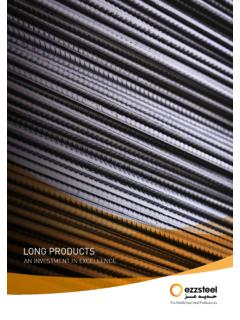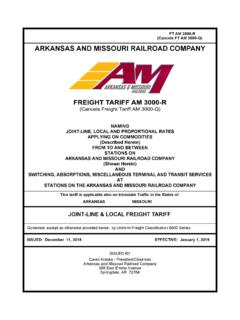Transcription of Cascade Steel: A History of Quality
1 Cascade Steel: A History of Quality Since we began operating in 1969, a dedication to production of Quality steel and the communities in which our plant is located has been the hallmark of Cascade Steel. As our mission statement declares, We are committed to the manufacture of Quality steel products at a competitive cost. We believe in maximizing profits using the latest technology with an emphasis on safety, teamwork, and customer satisfaction, and are resolved to ensuring a rewarding workplace for all.
2 In 1984, Cascade Steel was acquired by Schnitzer Steel Industries which continues a dedication to excellence through investment in technology. By combining this modernization of equipment with our skilled employees, Cascade Steel Rolling Mills remains on the forefront of Quality steel production and delivery and its success continues to benefit the local communities. As the state's largest recycler, we value our environment. We take scrap metal and items that would otherwise be disposed of old car parts, metal from demolished buildings and recycle them into reusable products.
3 Each year we recycle more than 800,000 tons of material, demonstrating our dedication to our environment. As one of the area's largest employers, we contribute to a vital economy. Cascade Steel provides the highest number of jobs in McMinnville, employing more than 500 workers. We contribute to the economy by paying our employees a family living wage and offering competitive benefits including healthcare, continuing education and retirement. As a leader in community service, we support local efforts for social responsibility.
4 Through donations of time, money and product we demonstrate the value we place on the community in which we live. In recent years, we've contributed to a variety of community efforts including: the Yamhill County Fair Livestock Pen Project, the McMinnville High School Welding Class, the Drew Ottley Memorial Skate Park, Kids on the Block after-school program and Head Start of Yamhill County. Our skilled employees produce Quality products. High marks in our Jacobson and Associates annual customer satisfaction report demonstrate the connection between our emphasis on finding and retaining hard working, dedicated employees and the timely delivery of Quality products.
5 Our customers are satisfied and our community benefits from our continued success. scrap specifications : Why do we need them? The Cascade Steel Scrap Acceptance Policy is based on scrap specifications . Scrap suppliers need the details of what we are looking for in our raw materials to determine if they can meet or exceed the criteria. The purpose of defining why you need scrap specifications leads to detailing the materials in the melting process. When we ask why we need certain things in steel making, we look to recycled scrap materials that meet or exceed the expectations for the characteristics of the customers steel requirements.
6 Size, density, chemistry, cleanliness, and many more unique features, all contribute to what we need in the specification . Each materials variance in its physical and chemical form makes it unique from all other scrap types. Shredded is not like bundles nor is it similar to machine shop turnings. They all perform differently in a melting environment and that is where the need for clear, well stated scrap specifications comes in. When we spend the time to define what is needed for the melting environment and train the supply base on these needs, we can expect materials that fit well in each of the categories.
7 Information on the melting traits of each scrap type is also vital to our process. A source may be providing material that has great chemistry qualities but is so light in density that we use little of it. Changing the materials physical form allows for increased sales of the material and better communication between consumer and supplier. Radiation Statement: Cascade Steel Rolling Mills policy is zero tolerance of radiation and radioactive materials in our scrap. Every load of scrap delivered by truck and rail is inspected for radiation.
8 If a source is found we follow CSRM Safe Job Procedures on radiation protocol and that includes notifying the appropriate state and local radiation personnel. A yellow DOT placard is affixed to the vehicle with the approved file number and released for transport. It is the responsibility of the shipper or radiation processor to remove the DOT placard prior to release of the vehicle and dispose properly. Please see pages 9, 11 and 16 for additional radiation data. Non-typical scrap buying: Occasionaly scrap that does not conform to our general speicifcation is offered to CSRM.
9 Our policy is to have senior management, SSI-purchasing, melting and logisitics staff review each material for chemical, physical, handling, pricing, etc. aspects of each material. A determination will then be made as to the viabaility of the scrap in the purchasing decision. Secondary "pup" coils are an example of such an scrap. Scrap Quality Remedies: When a scrap delivery does not meet expectations based on scrap specifications , the decision as to the disposition of this load, and potentially future loads, needs to be made.
10 We have four steps in our process to handle a poor Quality load. 1) First offense for a new shipper, if the error is not egregious and able to be handled with minimal reprocessing, a phone call and emails with pictures if necessary to show what the problem is. No monetary value adjustment - just a verbal warning. 2) New shipper and a current shipper to CSRM. If the error has not been solved with the verbal warning then a downgrade of monetary value or grade change may be in order. A minimum of $25 per net ton is the standard but may be increased depending on the severity of the problem.




